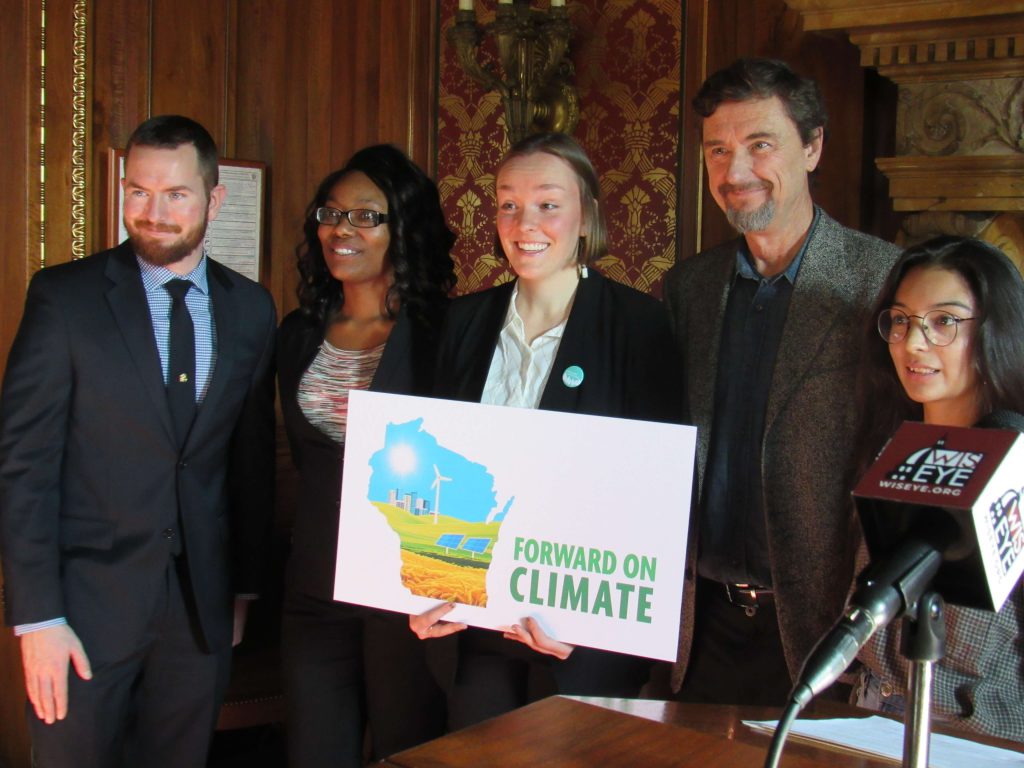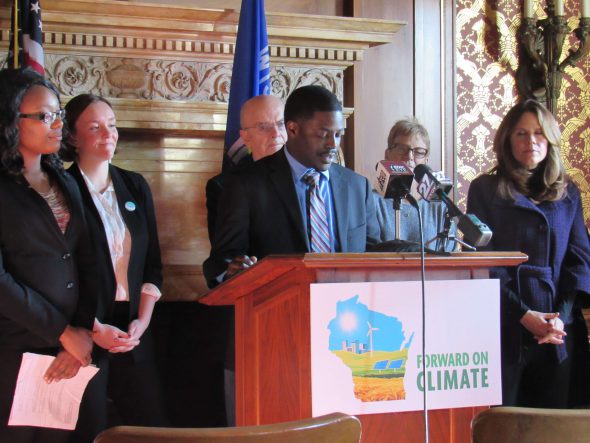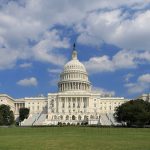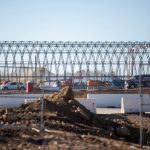Behold the Democratic Green Team
“Forward on Climate” package includes bills on green banks, weatherizing schools.

Representative Greta Neubauer (center) joins other supporters of the bill package. Photo by Isiah Holmes/Wisconsin Examiner.
A new package of bills introduced by Representatives Greta Neubauer (D- Racine), Dianne Hesselbein (D- Middleton ), Gary Hebl (D- Sun Prairie) and Sen. Dave Hansen (D- Green Bay), is aiming to jump-start Badger State climate policy. Collectively named the Forward On Climate package, the bills focus on financially supporting climate-resistant infrastructure for schools and farming communities. If passed, they’ll also establish “green banks” to sustain and manage these adaptive projects, and also require government agencies to examine the social costs of current carbon emission levels.
Joining the bill’s sponsors in the Capitol to announce the measures were several community members and co-sponsors of the package.

Rep. David Crowley and Rep. Chris Taylor helping announce the package of climate-related bills. Photo by Isiah Holmes/Wisconsin Examiner.
“Everyone in this room knows that climate change is real,” said Rep. David Crowley (D- Milwaukee), who joined his Democratic colleagues in announcing the bill package, “and that it qualifies now as an emergency and requires our immediate attention.” Having support among their collective, however, isn’t enough. “If only we could convince everyone in this building,” he continued, invoking his colleagues in the GOP. Crowley and company were also joined by Rep. Chris Taylor (D- Madison), and Rep. Shelia Stubbs (D- Madison).
“Dealing with the effects of climate change is our moral duty as lawmakers,” declared Crowley. “This package will help Wisconsinites now, and all Wisconsinites to come. I call on my colleagues across the aisle to recognize the emergency that we’re in right now. And to take action right now.” The package is broken up into four bills, focusing on distinct areas of concern for climate adaptation and mitigation.
One bill would establish grant programs for school districts to implement weatherization projects. “As many school buildings age, it can be difficult for local districts to afford the resources necessary to weatherize and retrofit old buildings to new energy efficiency standards,” the bill text states. A $1.5 million annual grant program would be established in the Wisconsin Department of Public Instruction, allowing school districts to strengthen infrastructure and transition to renewable energy. The maximum reward amount under the grant program would be $100,000, of which a school district may allocate 10% to educational materials related to weatherization projects.
A green bank would serve as a financial liaison and backbone for the restructuring of Wisconsin’s infrastructure. These unique institutions have been established in five U.S. regions including Connecticut, New York state, Rhode Island, Hawaii, Maryland and California.
Another measure would create a separate grant program under the Department of Agriculture for farmers who use sustainable practices. “Wisconsin’s farmers are facing additional pressure due to the rapid increase in extreme weather events exacerbated by climate change, including flooding, extreme heat, polar vortexes, and bomb cyclones,” the bill states. “By planting and maintaining certain types of vegetation, utilizing no or low-till farming practices, and changing grazing practices, our farmers can remove carbon dioxide from our atmosphere and sequester it in the ground.”.
The last bill in the package would require the Wisconsin Public Service Commission to consider the social costs of carbon in any analysis done during the approval process for construction projects, new infrastructure developments, and utility-scale energy facilities. “By carefully accounting for the impact and damages caused by carbon pollution, we can better estimate the cost and value of new utility-scale energy proposals to Wisconsin energy customers,” it states.
Supporters of the Forward On Climate package know they face an uphill battle. “I think that people on both sides of the aisle are seeing the facts, and they are also seeing the polls,” Neubauer told Wisconsin Examiner. “They know that the public believes that climate change is happening … and wants them to take action.”
Neubauer says that although there is still resistance and denial from the GOP leadership, it’s only a matter of time before her Republican colleagues join others seeking climate reforms. Neubauer, who holds a place on the state’s climate task force, said she expects bipartisan support will come, “when it means lower rates for their energy consumers, when it means good jobs, investments in rural communities. And I just hope that happens sooner rather than later.”
Stephanie Solgado, an immigrant from Honduras who spoke during the bill announcement, is keenly aware of the time crunch. “I personally think that climate issues relate to race and immigration issues because it’s all linked,” said Solgado. “With developing nations like Honduras, El Salvado, Nicaragua, we’re all connected to colonialism from the United States. They came in, took our resources, and are continuing to pollute because of lower regulations.”
Solgado pointed to eroding soil, deforestation and dangerous industries like mining as just a few issues afflicting her country. “Farmers are being underpaid from American buyers,” she explained, “everything from coffee, bananas, all those kinds of products. And at the same time, the United States is coming in with less regulations and bigger work forces.” Although Hondurans work the fields, much of the profit from their labor flows outside of their country. Solgado feels that these dynamics fuel increasing desperation, poverty, violence, and migration from her home country.
Stubbs, a co-author of the green bank bill, applauded the wide net the bills cast. Stubbs, like Neubauer, hopes the GOP joins in addressing these pressing matters.
“All 99 of us are sent here to work on behalf of the entire state, we represent our districts. And I think that we need to keep our priorities together,” Stubbs told Wisconsin Examiner. “ Climate change is real. Whether we like it or not, Mother Nature is changing. We can’t deny that. I think that what it comes down to is doing what’s right for your district, and doing what’s right for the state.”
“I’m hopeful that maybe at least one of our colleagues on the Republican side would join us in this work,” Stubbs added. “Because it impacts all of us in the state. That’s our hope.”
“I know that a number of Republicans believe and know that climate change is happening,” Neubauer said. “And I think that the roadblock is just getting the legislation to committee.” It’s for that reason that she encourages residents of rural Wisconsin to contact their local legislators, and share their concerns for climate-resistant infrastructure, and perhaps even bringing sustainable jobs to struggling districts.
Reprinted with permission of Wisconsin Examiner.
Political Contributions Tracker
Displaying political contributions between people mentioned in this story. Learn more.





















